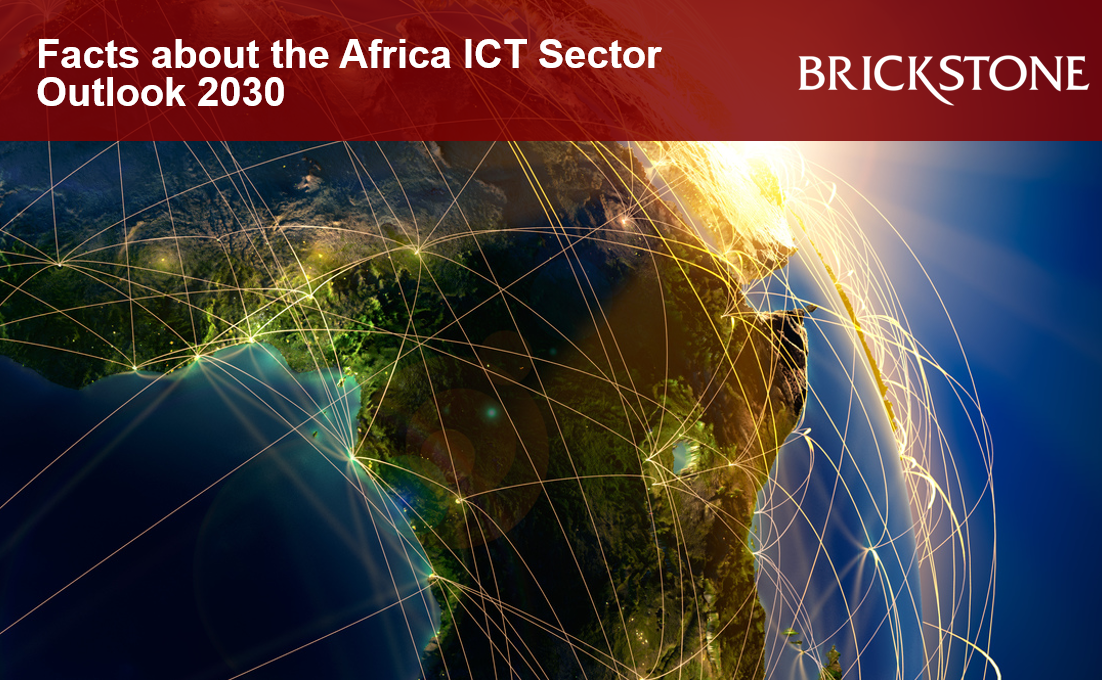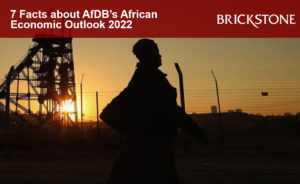Facts about the Africa ICT Sector Outlook – 2030
The Africa ICT Sector Outlook – 2030 provides an analysis of the current ICT environment on the African continent. Following an introduction explaining the importance of Africa to accelerate its migration to an e-economy, the report provides an ICT demand forecast for the continent. From a review of existing regional infrastructure, the gaps, efficiency gains and future needs of land-based infrastructure are discussed. The report concludes with an analysis of existing policies and institutional frameworks and provides a recommendation of priority projects to be implemented to accelerate ICT developments.
This article by Brickstone reviews NEPAD’s Africa ICT Sector Outlook – 2030, highlighting key facts and insights.
The Africa ICT Sector Outlook – 2030
The information and communication technology (ICT) sector has proven to be a transformational driver of both economic and social growth in nations across the world. Although Africa has also largely benefited from the great strides of ICT, the continent continues to lag behind the rest of the world in the reach and quality of its ICT penetration, majorly due to lack of land-based infrastructure, and outdated government policies.
According to NEPAD’s Africa ICT Sector Outlook – 2030, the ICT sector development has the potential to be truly transformative for the continent as it offers a platform from which its productive and consumptive sectors could leapfrog developmental stages and spur innovation across manufacturing, commerce, mining, and logistics and agriculture.
The following are key facts and insights from NEPAD’s Africa ICT Sector Outlook – 2030.
The telecommunication sector in Africa has been undergoing tremendous change for many years now. In less than 10 years, the sector has been shaken by major technological revolutions and Africa’s capacity to transpose practices and technologies in order to benefit from them. This includes voice services, internet services, IP world development, and international bandwidth.
The Africa ICT Sector Outlook affirmed that the gap existence between Africa and the rest of the world in terms of voice services has been widely closed in most countries. However, the internet digital divide between Africa and the rest of the world is huge and is widening day by day with an intra-African digital divide between countries with “comfortable access to (electronic payment…) and countries which remain landlocked or those which have not yet set up a “digital” policy.
The Africa ICT Sector Outlook – 2030 identified key lessons on the development and use of internet in African countries. This include consumers are very sensitive to operator commercial offers; domestic traffic becomes very important in terms of instant volume in countries where operators have “high speed internet access” offers covering residential areas; the traffic peak is generated by domestic traffic showing that the use of internet is part of the consumers’ life.
The 21st century will be globally marked by the development of an information society based essentially on e-economy. Information technologies have changed the world today. Infrastructure along with the IP world allows huge progress. The objective of the industrialized countries as well as some of the emerging countries, is not broadband access only but also high speed access. Without a strong and reliable internet service, the world of finance and business will slow down, trade with others may disappear and integration between the people will no longer be possible.
Access to international bandwidth is an essential resource for the development of an e-economy. It must be reinforced by regional land-based infrastructure in the majority of cases so as to: ensure competition between operators of submarine cables in order to reduce international broadband prices; connect all countries to at least 2 landing stations operated by two different operators to ensure international connectivity for all players; give landlocked countries access to landing stations at prices and security conditions similar to those of the coastal countries in order to avoid an intra-African digital divide; and achieve the objective of aligning international bandwidth prices with international good.
While at the highest level, regional integration is proclaimed as one of the most important issues for the development of Africa, reality is a completely different matter. In fact, today the implementation process of an ICT interconnection between two countries requires in a large number of countries the signature of a specific protocol by the two ministers of the countries involved. Therefore, one of the priorities is the development of a continental and regional guide simplifying the implementation of such infrastructure and especially the transposition at national level in all the African countries.
The Africa ICT Sector Outlook – 2030 identifies the inefficiency in national regulators authority. Accordingly, all African countries have set up a regulation authority as well as regional regulation associations. However, their operation does not seem to be in line with the sectors’ expectations. The main key points seem to be: independence towards the authorities but also an effective independence towards the players; non operation of some NRAs; lack of capacity and regulation tools; lack of separation between operators accounts and breakdown of costs.
According to NEPAD’s Africa ICT Sector Outlook – 2030, for Africa to beat its infrastructure deficit to attract broadband traffic to landing stations and interconnection inside the continent, African decision makers must implement a policy in synergy with the three major issues: regional infrastructure development; national infrastructure development and access infrastructure development. This development is a priority because it will also reduce investment costs and increase their effectiveness, better invest to have more infrastructure, and encourage private investors in the implementation of land-based infrastructure.
Download the complete Africa ICT Sector Outlook – 2030 here.






